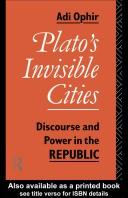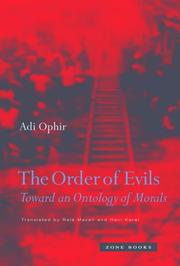| Listing 1 - 10 of 18 | << page >> |
Sort by
|
Book
ISBN: 1531503888 1531501427 Year: 2023 Publisher: New York : Fordham University Press,
Abstract | Keywords | Export | Availability | Bookmark
 Loading...
Loading...Choose an application
- Reference Manager
- EndNote
- RefWorks (Direct export to RefWorks)
This text explores God's use of violence as depicted in the Hebrew Bible. Ophir shows how the Bible's varied formations of divine violence anticipate the main outlines of the modern European state. A critique of the modern state, the book argues, must begin in unpacking its mostly repressed theological dimension.
Violence in the Bible. --- Bible. --- Criticism, interpretation, etc.

ISBN: 0415035961 9780415035965 Year: 1991 Publisher: London: Routledge,
Abstract | Keywords | Export | Availability | Bookmark
 Loading...
Loading...Choose an application
- Reference Manager
- EndNote
- RefWorks (Direct export to RefWorks)
Political philosophy. Social philosophy --- Plato --- Political science --- Philosophy. --- Political science - Philosophy.

ISBN: 1280186585 0203007344 9780203007341 9781134959747 1134959745 9781134959693 1134959699 9781134959730 1134959737 9780415035965 0415035961 9780415755337 0415755336 Year: 1991 Publisher: London Routledge
Abstract | Keywords | Export | Availability | Bookmark
 Loading...
Loading...Choose an application
- Reference Manager
- EndNote
- RefWorks (Direct export to RefWorks)
This book offers an original and detailed reading of Plato's Republic, one of the most influential philosophical works in the emergence of Western philosophy. The author discusses the Republic in terms of discursive events and political acts. Plato's act is placed in the context of a politico-discursive crisis in Athens at the end of the fifth and the beginning of the fourth century B.C that gave rise to the dialogue's primary question, that of justice. The originality of Dr. Ophir lies in the way he reconstructs the Republic's different spatial settings - utopia
Political science --- Political philosophy --- Philosophy. --- Plato.
Book
ISBN: 0804784337 9780804784337 9780804775915 9780804775922 0804775915 0804775923 Year: 2013 Publisher: Stanford, Calif. Stanford University Press
Abstract | Keywords | Export | Availability | Bookmark
 Loading...
Loading...Choose an application
- Reference Manager
- EndNote
- RefWorks (Direct export to RefWorks)
Since the start of the occupation of Palestinian territories in 1967, Israel's domination of the Palestinians has deprived an entire population of any political status or protection. But even decades on, most people speak of this rule-both in everyday political discussion and in legal and academic debates-as temporary, as a state of affairs incidental and external to the Israeli regime. In The One-State Condition, Ariella Azoulay and Adi Ophir directly challenge this belief.Looking closely at the history and contemporary formation of the ruling apparatus-the technologies an
Arab-Israeli conflict --- Palestinian Arabs --- Democracy --- Military occupation --- Israel-Arab War, 1967 --- Belligerent occupation --- De facto doctrine (International law) --- Occupation, Military --- Occupied territory --- Armed Forces in foreign countries --- War (International law) --- Conquest, Right of --- Military government --- Arab-Israel War, 1967 --- Six Day War, 1967 --- Influence. --- Government policy --- Social aspects --- Israel --- Politics and government --- Occupied territories. --- Internal politics --- anno 1960-1969 --- anno 1970-1979 --- anno 1980-1989 --- anno 1990-1999 --- Palestine
Book
ISBN: 0198744900 9780198744900 0191806013 0191062340 9780198866466 0198866461 Year: 2018 Publisher: Oxford, United Kingdom Oxford University Press
Abstract | Keywords | Export | Availability | Bookmark
 Loading...
Loading...Choose an application
- Reference Manager
- EndNote
- RefWorks (Direct export to RefWorks)
"Goy: Israel's multiple others and the birth of the gentile traces the development of the term and category of the goy from the Bible to rabbinic literature. Adi Ophir and Ishay Rosen-Zvi show that the category of the goy was born much later than scholars assume; in fact not before the first century CE. They explain that the abstract concept of the gentile first appeared in Paul's Letters. However, it was only in rabbinic literature that this category became the center of a stable and long standing structure that involved God, the Halakha, history, and salvation. The authors narrate this development through chronological analyses of the various biblical and post biblical texts (including the Dead Sea scrolls, the New Testament and early patristics, the Mishnah, and rabbinic Midrash) and synchronic analyses of several discursive structures. Looking at some of the goy's instantiations in contemporary Jewish culture in Israel and the United States, the study concludes with an examination of the extraordinary resilience of the Jew/goy division and asks how would Judaism look like without the gentile as its binary contrast"--Publisher's website.
Gentiles in the Bible --- Gentiles in rabbinical literature --- 296*11 --- 296*3 --- 296*13 --- 296*21 --- Rabbinical literature --- 296*21 Misjna --- Misjna --- 296*13 Midrasj --- Midrasj --- 296*3 Apocriefen --- Apocriefen --- 296*11 Tekstraditie van de Bijbel --- Tekstraditie van de Bijbel --- Gentiles in the Bible. --- Gentiles in rabbinical literature. --- Gentils dans la Bible. --- Gentils dans la littérature rabbinique. --- Nichtjude. --- Judentum. --- Gentiles (Jewish law).
Book
ISBN: 9781907946417 1907946411 Year: 2013 Publisher: London: Macbooks,
Abstract | Keywords | Export | Availability | Bookmark
 Loading...
Loading...Choose an application
- Reference Manager
- EndNote
- RefWorks (Direct export to RefWorks)
Adam Broomberg et Olivier Chanarin travaillent ensemble depuis une vingtaine d’années. Ils se sont rencontrés à Colors Magazine avant de s’envoler ensemble pour créer leurs propres images. Ils publient une bible illustrée d’images et notamment de catastrophes. S’inspirant de la Bible personnelle de Bertold Brecht, poète allemand, Olivier Chanarin et Adam Broomberg ont illustré ensemble une Bible avec des images évoquant la catastrophe. Au premier abord, cet ouvrage peut sembler un peu enfantin, facile ou irréfléchi. En réalité, il évoque une certaine histoire de la photographie et l’obsession de ce medium pour le conflit et les désastres. À travers des images violentes, les deux artistes tentent de montrer que les images de conflit ont encore moins de pouvoir aujourd’hui et qu’elles n’influent en rien la politique. Elles sont simplement un témoin obsessionnel de notre triste histoire. Le livre se termine par un essai d’Adi Ophir, intitulé Divine Violence. Il y constate que dans la Bible, Dieu s’exprime par la catastrophe et qu’un parallèle intéressant peut être fait avec nos sociétés actuelles : « Les États tentent d’imiter Dieu en récoltant les bénéfices de désastres, même quand ils disent ne pas en être la cause, parce qu’un désastre permet de déclarer un état d’urgence et donc de justifier l’autorité totale de l’État. »
Photographie --- Illustration, livre --- Bible --- Broomberg, Adam --- Chanarin, Oliver --- Brecht, Bertold --- Illustration

ISBN: 189095151X 9781890951511 Year: 2005 Publisher: New York (N.Y.) Zone books
Abstract | Keywords | Export | Availability | Bookmark
 Loading...
Loading...Choose an application
- Reference Manager
- EndNote
- RefWorks (Direct export to RefWorks)
Arab-Israeli conflict --- Good and evil --- Holocaust, Jewish (1939-1945) --- Jewish ethics --- Philosophy, Modern --- Ethics, Jewish --- Jews --- Religious ethics --- Evil --- Wickedness --- Ethics --- Philosophy --- Polarity --- Religious thought --- Israel-Arab conflicts --- Israel-Palestine conflict --- Israeli-Arab conflict --- Israeli-Palestinian conflict --- Jewish-Arab relations --- Palestine-Israel conflict --- Palestine problem (1948- ) --- Palestinian-Israeli conflict --- Palestinian Arabs --- Moral and ethical aspects --- History --- Arab-Israeli conflict. --- Begriff. --- Das Böse. --- Ethics. --- Ethiek. --- Gesellschaft. --- Good and evil. --- Jewish ethics. --- Jüdische Ethik. --- Ontologie. --- Philosophie. --- Philosophy, Modern. --- Wert. --- erkölcs --- etika --- jó és rossz --- Moral and ethical aspects. --- Etika. --- 1900-1999.
Book
ISBN: 9781890951924 1890951927 Year: 2009 Publisher: New York (N.Y.) Zone Books
Abstract | Keywords | Export | Availability | Bookmark
 Loading...
Loading...Choose an application
- Reference Manager
- EndNote
- RefWorks (Direct export to RefWorks)
"On the eve of its fifth decade, the Israeli occupation in the Palestinian territories can no longer be considered a temporary aberration. In the shadow of the Oslo process, the second Intifada and the “disengagement” from and recurring assaults on Gaza, Israel’s control over Palestinian life, society, space, and land has become firmly entrenched, while acquiring more sophisticated and enduring forms.The Power of Inclusive Exclusion analyzes the Israeli occupation as a rationalized system of political rule. With essays by leading Palestinian and Israeli scholars, a comprehensive chronology, photography, and original documents, The Power of Inclusive Exclusion calls into question prevalent views of the occupation as either a skewed form of brutal colonization, a type of Jewish apartheid, or an inevitable piecemeal and improvised response to terrorism.Engaging a variety of disciplinary and intellectual perspectives, the writers address the fundamental and contemporary dimensions of the occupation regime — its unpredictable bureaucratic apparatus, the fragmentation of space and regulation of movement, the intricate tapestry of law and regulations, the discriminatory control over economic flows, and the calculated use of military violence. Pretending neither to sidestep the issue of Israel’s responsibility for the Palestinian plight nor to portray the occupation as a coherent, premeditated project, The Power of Inclusive Exclusion uncovers the structural logic that sustains and reproduces this occupation regime. Sensitive to the specific features of the Israeli occupation, this meticulous collection nonetheless strives to unravel the similarities this occupation shares with other international and contemporary forms of discriminatory rule.In a time when military occupations are emerging globally, political disasters abound, and protracted control over groups of noncitizens has been normalized, The Power of Inclusive Exclusion provides a new set of categories crucial to our understanding of emergency regimes and duly identifies the stakes necessary for an informed and timely opposition."
Arab-Israeli conflict --- Palestinian Arabs --- Occupied territories. --- Government policy --- Gaza Strip --- West Bank --- Israel --- Politics and government. --- Politics and government
Book
Abstract | Keywords | Export | Availability | Bookmark
 Loading...
Loading...Choose an application
- Reference Manager
- EndNote
- RefWorks (Direct export to RefWorks)
Violence, calamity and the absurdity of war are recorded extensively within The Archive of Modern Conflict, the largest photographic collection of its kind in the world. For their most recent work, Holy Bible, Adam Broomberg and Oliver Chanarin mined this archive with philosopher Adi Ophir’s central tenet in mind: that God reveals himself predominantly through catastrophe and that power structures within the Bible correlate with those within modern systems of governance.The format of Broomberg and Chanarin’s illustrated Holy Bible mimics both the precise structure and the physical form of the King James Version. By allowing elements of the original text to guide their image selection, the artists explore themes of authorship, and the unspoken criteria used to determine acceptable evidence of conflict.Inspired in part by the annotations and images Bertolt Brecht added to his own personal bible, Broomberg and Chanarin’s publication questions the clichés at play within the visual representation of conflict.
Book

ISBN: 9780823276714 Year: 2018 Publisher: New York, NY
Abstract | Keywords | Export | Availability | Bookmark
 Loading...
Loading...Choose an application
- Reference Manager
- EndNote
- RefWorks (Direct export to RefWorks)
| Listing 1 - 10 of 18 | << page >> |
Sort by
|

 Search
Search Feedback
Feedback About UniCat
About UniCat  Help
Help News
News